10 thoughts about the future-classic Hyundai Ioniq 5 N

The Hyundai Ioniq 5 N is one of the first electric cars that I think qualifies as a future classic. Mark my words, you’ll be seeing this sucker, rightfully so, at car shows forever hence. The reason? It has character for days. And even if much of that character comes via “artificial,” software-based means rather than engineers fiddling with mechanical tuning to put on a show, I discovered that I didn’t really care. The Ioniq 5 N is incredibly fun – to drive, to look at and to be in. I mean, this is a 641-horsepower all-wheel-drive hot hatch in robin’s egg blue with orange accents that can drift, but also has an enormous back seat, family-friendly storage and can silently waft along like any other EV while commuting or running errands.
Hot hatches have often been pegged as the only car you’d ever need. Pretty sure this one qualifies. OK, unless you want to go on a road trip on a holiday weekend – definitely rent an ICE car for that to avoid public charging – but besides that, hot hatch all-star.
It crackles and pops!
By the time I really opened things up on Mulholland Highway, I already knew (and was very much amused by) the Ioniq 5 N’s artificial engine noises and shifts. What I had yet to experience was the fact that it also simulates the crackles and pops of an exhaust on overrun.
Brake hard into a turn. The car rev-match “downshifts” one or more times, barking the “exhaust”; get back on the throttle, and if you lift ever so slightly … rabble rabble crackle pop. What?!? I laughed. Such exhaust histrionics have had a tendency to go a little overboard as they’ve become more common (remember the “engineers fiddling with mechanical tuning” from earlier?), but to have them in an electric car? That’s just ridiculous … in the best damn way possible. It’s like the way that The Darkness is ridiculous. It’s in on the joke and knows it’s ridiculous. Car and band are similarly unabashedly loud in noise and style. I believe in a thing called love, and I love this car.
‘The car is farting!’
I wrote the previous “thought” and then took my son for a drive having discovered the Ioniq 5 N’s special trick. The farting quote was his response. He loved it. Laughed like crazy. Between this, the multi-color ambient lighting and the blue paint job, I’m pretty sure this is his new favorite car. Just thought I’d pop this in here.
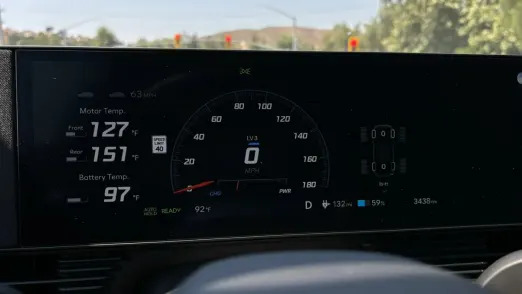
With this instrument design/layout, a “tach” surrounding the gear selection indicates e-Shift is active. With an “analog” speedo surrounding a digital one, you have regular no-shift EV acceleration active.
All the drive mode customization is extremely confusing
Back to my thoughts. As much as I love what the Ioniq 5 N’s myriad customization settings can result in, the user interface is frightfully confusing and needs a rethink. There’s a Drive mode button (wheel upper left in blue) that cycles through Eco, Normal and Sport. There are two big wheel buttons labeled N, the left one a white-outlined black N and the right one a solid white N. The left one selects the full Habanero N drive mode or your custom mode. Now, there are Custom 1 and Custom 2 choices you can customize using the touchscreen (pictured below left), but for the life of me, I couldn’t figure out how to actually engage Custom 2. The white N button seems to turn on the N e-Shift fake transmission function regardless of drive mode along with the currently selected N Active Sound+ setting. To make that selection you have to press the physical Settings button, then the “Vehicle” icon button in the touchscreen, then the “N Active Sound+” touchscreen button. See? It’s confusing, and I didn’t even dip into the track-intended touchscreen list of features such as N Drift mode.
There has got to be a better way to do all that.
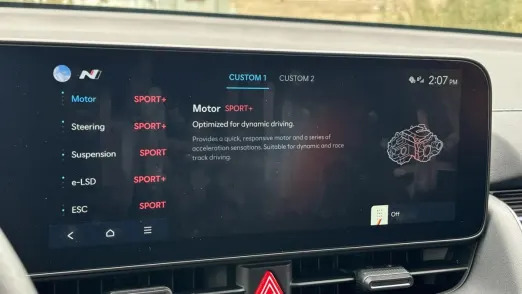
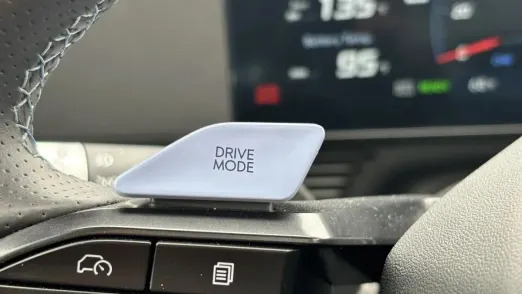
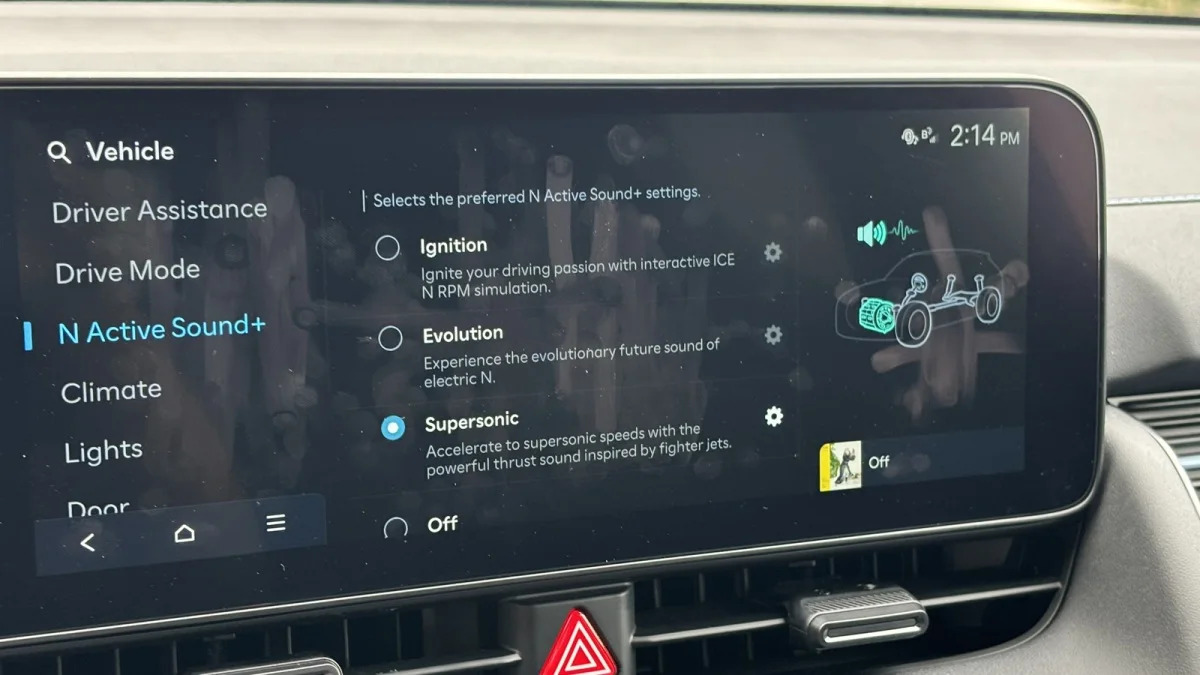
I really only liked one of the fake noises
As gloriously ridiculous as I found the simulated powertrain noises, I really only liked one variation of the many combinations available: the “Ignition” setting that simulates a high-performance turbocharged four-cylinder when paired with the N e-Shift simulated gear changes. The sound itself actually differs depending on whether the “transmission” is in automatic (higher pitch) or paddle shift manual mode (deeper pitch). Without e-Shift engaged, Ignition sounds like the car has a CVT, so no thank you.
There are two other N Active Sound+ options. “Evolution” is described in the touchscreen as “Experience the evolutionary future sound of electric N” and is apparently based on what Hyundai’s RN22e prototype vehicle sounded like. I guess it’s clearly more electric in nature, and if it wasn’t for Ignition, maybe I’d be more inclined to try it. Definitely works better than Ignition if you’re not using e-Shift. The other is “Supersonic,” which the touchscreen describes as inspired by twin-engine fighter jets. Um, OK. It’s weird, I don’t get. Both sound absolutely nonsensical with e-Shift engaged.
To each their own, but I would like Hyundai to go even further here with additional Ignition-like engine noises. Why stop at a turbo-four? What about a sweet inline-six? Flat-plane V8? Explore the space, man.
Why eight gears?
I know Hyundai was trying to mimic the performance of its eight-speed dual-clutch automated manual, but that has eight speeds for fuel economy purposes. I guess if you’re driving in manual mode on the highway and want a greater control of powertrain noise, having that many “gears” is helpful? I don’t know, if I’m on the highway, I’m not using e-Shift at all, and even if I was, would I really want to make my way through eight gears? I do not. Six seems enough.
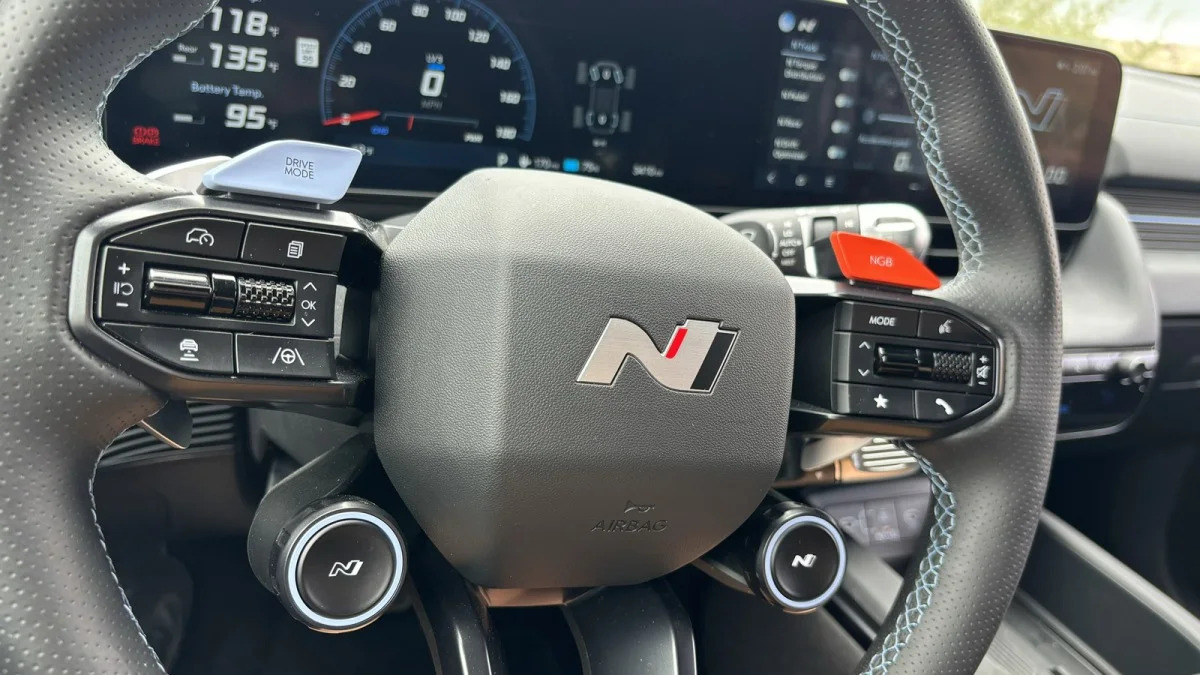
It goes from 0 to 60 in eleventy different ways
Because of all the described setting combinations and sound options, the way the Ioniq 5 N accelerates from 0 to 60 can differ wildly depending on what you’ve selected at any given point. For the full, face0flattening launch, you put it in N mode and press the orange NGB steering wheel button (“N Grin Boost”) that unleashes the car’s full 641 horsepower for 10 seconds (you can engage whenever, not just when launching). A little icon illuminates telling you it’s OK to launch. Launch. No fake noises needed for that thrill, but if you want the experience to be old-school, complete with DIY shifts, you can do that too. The car will even let you hit “the rev limiter” and screw up the launch, albeit without fear of blowing something up. I mentioned it was gloriously ridiculous, right?
It defies its weight and is a joy to flick through corners, too
The Ioniq 5 N weighs all of the pounds, but I only thought it was noticeable when the suspension compressed over really large bumps, and typically lower speeds. Otherwise, masterful suspension tuning and powertrain trickery, plus an e-LSD at the rear, contribute to a car that happily flung itself amongst the narrow, technical, back-and-forth esses of my Santa Monica Mountains drive route. It feels big, but definitely not as big as its dimensions would suggest. In that way, it reminded me of the Mercedes-AMG GLA 35, which I described as an XL hot hatch. Maybe the Ioniq 5 N is an XXL, but it’s a hot hatch nevertheless.
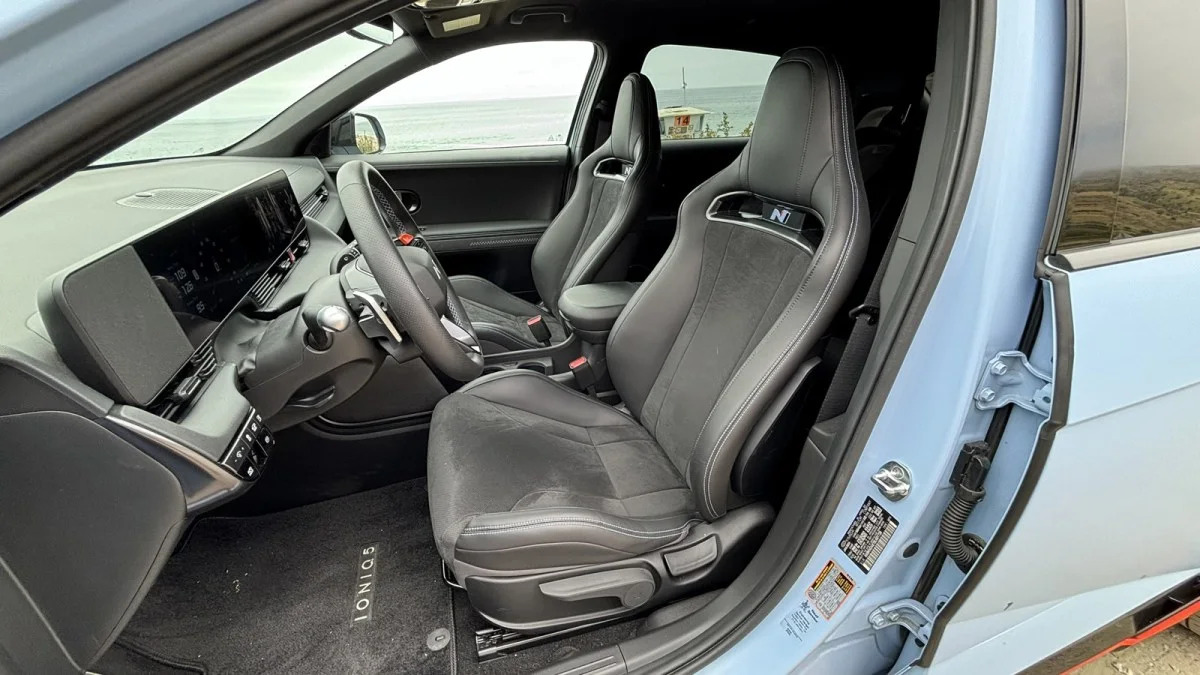
It shouldn’t have manual seats
A $66,100 car should not have manual seat adjustment. The seats themselves are phenomenal; they’re supportive over distance and for lateral movement, and I actually found they provided a sufficient range of adjustment, which is rare for manual seats. Nevertheless, it would be a royal pain to share this car with my 5-foot-zip wife, which brings me to the follow-up point: No power seats means no memory settings.
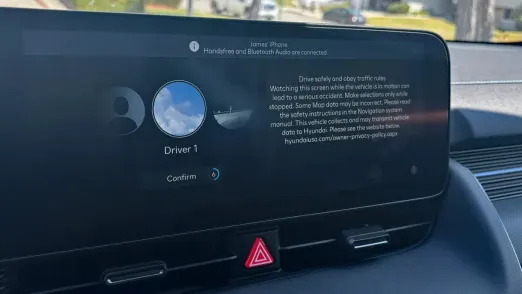
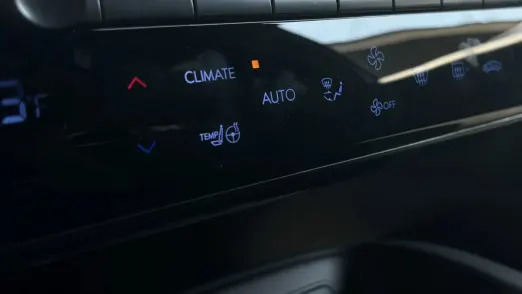
Hyundai (and Kia) has ruined its infotainment system
Hyundai and Kia have been rolling out a new infotainment system, and I’m sorry, it’s worse. First, it’s slow to boot up, a fact made all the more painful by the Ioniq 5 not having physical controls for the heated and cooled seats (as my Kia Niro EV has). As it is, you have to wait and wait and wait for the system to fullly boot up and/or press confirm on a lawyer screen (above left), then press the seat climate button (above right), then wait, then press the seat cooling/heating button on the screen, then exit that screen, then go about the typical entertainment choice. As opposed to “looks down at center console, presses button, gets on with your life.”
Speaking of entertainment choice, the changes made to the radio interface are even worse. Song information is no longer displayed alongside the channel list (picture below left). Instead, there’s a tiny rectangular icon in the lower right-hand corner with an album art thumb and the name of the selected channel – which is already indicated in the channel list, by the way. Pressing that tiny icon takes over the entire damn screen with album art and the song info (below right). Let me get this straight, my choices are no song info or nothing but song info? BMW and VW have also made this switch. Why? How does someone prefer this? Worse, you can no longer make the split-screen content on the right side show entertainment information. So, you also can’t see what’s playing on the entertainment system with the navigation screen or Apple CarPlay up. Oh, but I can see a compass and weather info. Why?
Hyundai’s system used to be so user-friendly, and I’d love to know why these changes were made. Until my next Hyundai press event when I can chat with someone in-the-know …
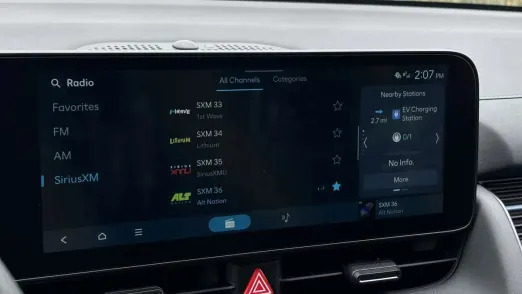
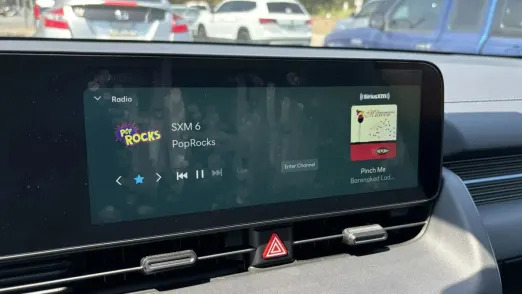
I would buy this car
Of my above gripes, the manual-only seat is the only thing that probably couldn’t be fixed or enhanced with an OTA update. Consider them, therefore, constructive feedback. In any event, nothing would dissuade me from putting the Hyundai Ioniq N on the pedestal for “My Favorite Car.” It’s an utter riot that looks cool, goes like stink, won’t stink up the environment and is legitimately practical. I believe in a thing called love …



